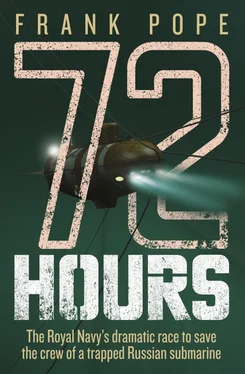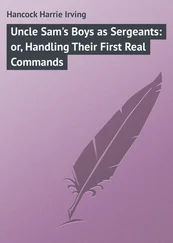The vehicle rolled noisily towards the gate, passing some gloomy hangars. He’d seen some situations in his career, but this one already felt like a surreal Cold War movie. Then the car passed in front of the imposing silhouettes of several MIG fighter jets. Further off the main apron, shrouded by the mist and hidden by bushes, giant Tupolev and Beriev bombers lurked.
The rain and the long, fading northern twilight made Nuttall feel at home. Although the military angle was new, the strangeness of being on Russian soil didn’t faze him. He’d crewed on ships all over the world, including Nigeria, China, and Japan. He’d worked off Russian ships that had been chartered to offshore engineering companies, and admired the Russians as people. They might look pretty dour and serious, but they had a good sense of humour and they liked to party.
An engineer by training, Nuttall also appreciated that the Russians had designed equipment that was unlike anything seen in the West. The separate evolution had spawned everything from enormous hovercrafts and helicopters to completely different ways to lift heavy loads – such as a submersible – over the sides of ships. On Western ships, an A frame is usually swung out over the water, but Russian vessels often used a system of twelve pulleys all mounted at different angles with a spider’s web of ropes to control the deployment. It was complicated, but it allowed cargo to be landed anywhere on the deck without a big, expensive crane.
Although strange and exotic locations were a given in the offshore business, some things always remained the same no matter where you went. Since the boom in offshore oil exploitation in the 1950s and 1960s, the ingredients for successful underwater operations had been all but standardised. When new technologies appeared and were proven, they were taken up by all serious players. One of these was Dynamic Positioning. Guided by satellite, individual thrusters on each corner of a vessel allowed it to hold not only its position but also its orientation. Other kit made work easier or safer. Saturation diving bells were launched from moon-pools located in the very centre of the vessel, and cranes were fitted with compensators that could cancel out the movement of the swell beneath. Underwater tracking systems could monitor the location of any vehicle or diver in three dimensions on screens in the control room. But in the end these were niceties. Give Nuttall power and a stable platform, and he was confident he could get the job done.
Outside the airfield, the drab, military style of the architecture continued through the outskirts of town. The wide, potholed roads had been patched so many times it was hard to make out the original tarmac. Occasional wrecked cars studded the scenery. Ragtag groups of people stood around bleak concrete bus shelters whose walls screamed with indecipherable graffiti. Every now and then a bus or a lorry rumbled past, leaving the air laced with sulphurous smoke. A few of the vehicles were home-grown, boxy Ladas, but being so far east there were more cheap Japanese imports than anything else.
Lost in thought and anticipation, the three rescuers watched in silence as this strange and remote world rolled past them.
As they reached the edge of town, Captain Holloway turned and said a few words to the driver, who nodded. A few minutes later, the car pulled off the main road and stopped beside a bleak-looking shop.
‘Right, what sort of chocolates do you like?’ asked Holloway.
Nuttall and Cave looked at one another. ‘Er, we’re in a bit of a hurry, mate. Can we get going?’ Nuttall replied.
Holloway knew better. He’d been on Russian Navy ships before. At his insistence the two men shrugged and came inside to help him pick out a bag full of chocolate bars – Curly Wurlys, Mars Bars, Snickers, Picnics, Twix – and biscuits. Russia might lack a lot of things, thought Nuttall, but some stuff you could get anywhere.
The minibus lurched back on to the road and left the town behind. About an hour after they’d left Elizovo airport, they pulled off the main road and crunched to a halt in front of a security gate. A rusting sign indicated to Holloway that this was Petropavlovsk’s civilian port. At the sight of the approaching vehicle, two guards with pistols on their hips stepped out into the road from their hut. Although it was not a military facility, according to official guidelines, permission to gain access to it would require a 45-day notice period. Holloway was praying that the two-track system would work here as it had at Moscow airport, but there was a chance that it would not. Thankfully, after only a ten-minute delay, the guards swung open the gates and pointed them in the direction of their designated vessel.
The team squinted through the windshield as they approached the jetty. Around a dozen ships were lined up alongside the crumbling concrete, one behind the other. In the darkness it looked to Nuttall much like other remote dockyards, dominated by looming hulls and cranes. Holloway, too, was used to the sight of Russian dockyards and reasoned that though the vessels might look rusty and decrepit, their designs were simple and rugged enough to withstand the decades of neglect. At least none of them were sinking, he thought. They finally stopped in front of one, the anchor-handling and buoy-laying Sura-class tug KIL-27 . She seemed the best of the lot, her squat shape giving her an air of sturdiness, if not speed.
As they stepped out of the car a uniformed officer strode up to meet them. His aloof bearing, together with the thin red stripe nestled between the officer’s stripes on his epaulette, marked him out as a member of the Naval Infantry or a staff officer, but his bearing and behaviour suggested he was from the feared Main Intelligence Directorate, the GRU. He announced that he was there to see to their needs, Holloway immediately recognised he would be watching their every move.
Led on board by this escort, the advance party stepped on to the rusting deck on which they were going to install their rescue system. While the ship’s master was talking to Captain Holloway, Nuttall and Cave began plotting where they were going to install the gear. They would need clean deck space to weld down their control container, the deployment crane and the winch for the spool of umbilical cable, and there had to be a clear exit to swing Scorpio over the side. The master nodded, gesturing for them to
Led on board by this escort, the advance party stepped on to the rusting deck on which they were going to install their rescue system. While the ship’s master was talking to Captain Holloway, Nuttall and Cave began plotting where they were going to install the gear. They would need clean deck space to weld down their control container, the deployment crane and the winch for the spool of umbilical cable, and there had to be a clear exit to swing Scorpio over the side. The master nodded, gesturing for them to look around and pick their spot. A welder would be despatched to help them immediately.
‘We’re also going to need a three-phase power feed, between 380 and 480 volts. And what’s your hertz? A screen from the positioning system would be nice too,’ Nuttall said.
The master frowned as he listened to Holloway’s translation. ‘There’s no Dynamic Positioning on the vessel,’ came the reply through Holloway. ‘He says it’s thirty-five years old.’
Nuttall caught his breath. How were they going to pull this off if they couldn’t hold position over the site? But he didn’t object. There was more than one way to skin a cat. Besides, there was nothing he could do right now – he had to work with what he’d been given. He and Cave began walking the deck to work out where their equipment should be sited. In the end there was only one place it could go: slap in the middle of the ship. But even then there wasn’t a big enough gap for the crane to be installed and still leave room to swing Scorpio overboard. Workshops had been installed around the perimeter of the whole ship. The best solution would be to put the crane on top of one of them. They started to investigate.
Читать дальше












